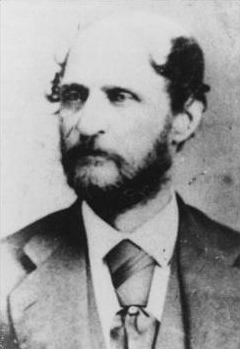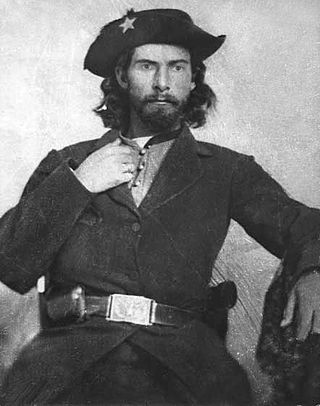Related Research Articles

George Edward Pickett was a career United States Army officer who became a major general in the Confederate States Army during the American Civil War. He is best remembered for being one of the commanders at Pickett's Charge, the futile and bloody Confederate offensive on the third day of the Battle of Gettysburg that bears his name.

During the American Civil War, the United States of America (USA) was referred to as the Union, also known colloquially as the North, after eleven Southern slave states seceded to form the Confederate States of America (CSA), which was called the Confederacy, also known as the South. The name the "Union" arose from the declared goal of the United States, led by President Abraham Lincoln, of preserving the United States as a constitutional union.

William "Extra Billy" Smith was a lawyer, congressman, the 30th and 35th Governor of Virginia, and a major general in the Confederate States Army during the American Civil War. On his appointment in January 1863, at 65, Smith was the oldest Confederate general to hold field command in the war.

George Washington Gordon was a general in the Confederate States Army during the American Civil War. After the war, he practiced law in Pulaski, Tennessee, where the Ku Klux Klan was formed. He became one of the Klan's first members. In 1867, Gordon became the Klan's first Grand Dragon for the Realm of Tennessee, and wrote its "Precept," a book describing its organization, purpose, and principles. He was also a member of the United States House of Representatives for the 10th congressional district of Tennessee.

Birkett Davenport Fry was an adventurer, soldier, lawyer, cotton manufacturer, and a Confederate brigadier general in the American Civil War. A survivor of four battle wounds, he commanded one of the lead brigades during Pickett's Charge at the Battle of Gettysburg.
Thomas J. Seay was an American Democratic politician who was the 27th Governor of Alabama from 1886 to 1890.

Bushwhacking was a form of guerrilla warfare common during the American Revolutionary War, War of 1812, American Civil War and other conflicts in which there were large areas of contested land and few governmental resources to control these tracts. This was particularly prevalent in rural areas during the Civil War where there were sharp divisions between those favoring the Union and Confederacy in the conflict. The perpetrators of the attacks were called bushwhackers. The term "bushwhacking" is still in use today to describe ambushes done with the aim of attrition.

Columbia, the capital city of South Carolina, was an important political and supply center for the Confederate States Army during the American Civil War. Much of the town was destroyed during occupation by Union forces under Major General William T. Sherman during the Carolinas Campaign in the last months of the war. Sherman was accused of having deliberately and needlessly burned the city, which he denied. Modern historians say that multiple causes were responsible.
The American Civil War bibliography comprises books that deal in large part with the American Civil War. There are over 60,000 books on the war, with more appearing each month. Authors James Lincoln Collier and Christopher Collier stated in 2012, "No event in American history has been so thoroughly studied, not merely by historians, but by tens of thousands of other Americans who have made the war their hobby. Perhaps a hundred thousand books have been published about the Civil War."

Mutiny on the Amistad: The Saga of a Slave Revolt and Its Impact on American Abolition, Law, and Diplomacy (1987) is a history of a notable slave mutiny of 1839 and its aftermath, written by professor Howard Jones.
The following list is a bibliography of American Civil War Confederate military unit histories and are generally available through inter-library loan. More details on each book are available at WorldCat. For an overall national view, see Bibliography of the American Civil War. For histories of the Union, see Bibliography of American Civil War Union military unit histories. For a guide to web sources see: Carter, Alice E.; Jensen, Richard. The Civil War on the Web: A Guide to the Very Best Sites—Completely Revised and Updated (2003).
William Raymond Lee was an officer in the Union Army during the American Civil War. He was born in Salem, Massachusetts. His father was also named William Raymond Lee and his mother was Hannah Lee. He married Helen Maria Amory and had 3 children: Elizabeth Amory, Arthur Tracy (1844–1870) and Robert Ives. He served as colonel of the 20th Massachusetts Infantry Regiment and led it during the Battle of Antietam. A veteran of several major battles, Lee suffered a mental break down the morning after Antietam and abandoned his regiment. According to a subordinate, Lee was found a few weeks later “without a cent in his pocket, without anything to eat, without having changed his clothes for 4 weeks, during all which time he had this terrible diarrhea…. He was just like a little child wandering away from home.” After the war ended he was brevetted brigadier general.
Manisha Sinha is an Indian-born American historian, and the Draper Chair in American History at the University of Connecticut. She is the author of The Slave's Cause: A History of Abolition (2016), which won the Frederick Douglass Book Prize.
Heather A. Williams is a scholar of African American studies and lawyer. She serves as Presidential Professor and Professor of Africana Studies at the University of Pennsylvania.
Clarence L. Mohr was a professor of American history and an author. He was a lecturer at Yale in 1979 as a fellow of American Council of Learned Societes, before obtaining posts as a professor at Tulane University, and University of South Alabama.
Charles Vincent is an American historian, professor, and author. He a professor in the history department at Southern University in Baton Rouge, Louisiana since 2017. Vincent serves as director of the Mwalimu Institute.
Thomas Lawrence Connelly was an American historian and author who specialized in the Civil War era. He is perhaps best known for his book, The Marble Man: Robert E. Lee and His Image in American Society, one of the most scholarly and critical books on Robert E. Lee.
Elisabeth Joan Doyle was an American historian, author, and educator who specialized in nineteenth century American and British history.
Ted Tunnell is a history professor and author in the United States. He has taught history at Virginia Commonwealth University. He wrote a book about the Reconstruction era in Louisiana, edited Marshall Twitchell's autobiography, and wrote a book about him. He appears on film in an interview for the show American Experience discussing Twitchell.
Daniel E. Sutherland is an American historian who has written books about 19th century America. He wrote a book titled The Confederate Carpetbaggers about southerners who moved north after the American Civil War.
References
- 1 2 "Lesley J. Gordon". University of Alabama. Retrieved October 12, 2017.
- ↑ "Lesley J. Gordon". OAH Distinguished Lectureship Program. Organization of American Historians . Retrieved October 12, 2017.
- ↑ Kuhl, Kenny (May 8, 2015). "Well Respected Civil War Historian, Lesley Gordon to Speak in Granby". Granby Patch. Retrieved October 12, 2017.
- ↑ "Selected Works of Dr. Lesley Gordon". University of Akron . Retrieved October 12, 2017.
- ↑ "Lesley Gordon". VQR. Retrieved October 12, 2017.
- ↑ "The Department of History is Pleased to Welcome Dr. Lesley J. Gordon, the Charles G. Summersell Chair of Southern History, to the department". University of Alabama. September 1, 2016. Retrieved October 12, 2017.
- ↑ "History of the Press". UAPress.ua.edu. University of Alabama. Retrieved December 3, 2023.
- ↑ Toney, B. Keith (November 8, 2001). "Book Review: General George E. Pickett in Life and Legend". America's Civil War– via HistoryNet.
- ↑ Power, J. Tracy (1999). "General George E. Pickett in Life and Legend (review)". Civil War History. 45 (3): 272–273. doi:10.1353/cwh.1999.0080. ISSN 1533-6271. S2CID 144034975 – via Project MUSE.
- ↑ "General George E. Pickett in Life and Legend by Lesley J. Gordon". Kirkus Reviews. December 7, 1998.
- ↑ Reviews of General George E. Pickett in Life and Legend: Kirkus Reviews (1998), ; Elizabeth D. Leonard (1999), The Pennsylvania Magazine of History and Biography 123 (4): 385–387, JSTOR 20093332; J. Tracy Power (1999), Civil War History 45 (3): 272–273, doi : 10.1353/cwh.1999.0080; Michael Fellman (1999), The Georgia Historical Quarterly 83 (1): 166–168, JSTOR 40584023; Paul Christopher Anderson (2000), The Florida Historical Quarterly 78 (3): 377–379, JSTOR 30150585.
- ↑ Miller, Joel (2005). "Review of Fellman, Michael; Gordon, Lesley J.; Sutherland, Daniel E., This Terrible War: The Civil War and its Aftermath". H-Net Reviews. Retrieved October 12, 2017.
- ↑ Review of This Terrible War: The Civil War and Its Aftermath: Thomas A. DeBlack (2004), The Arkansas Historical Quarterly 63 (1): 77–79, JSTOR 40019014.
- ↑ Reviews of A Broken Regiment: The 16th Connecticut’s Civil War: Thomas J. Balcerski (2015), Civil War History 61 (3): 303–305, doi : 10.1353/cwh.2015.0047; Gerald. J. Prokopowicz (2015), The Journal of the Civil War Era 5 (4): 601–603, doi : 10.1353/cwe.2015.0068, JSTOR 26070363.
- ↑ "Interview: Dr. Lesley Gordon, Civil War History". Bull Runnings. July 10, 2010. Retrieved October 12, 2017.
- ↑ Bergeron, Judy (March 21, 2017). "Actor Noah Wyle gets surprising news about Baton Rouge ancestor on TLC reality show". The Advocate. Retrieved October 12, 2017.